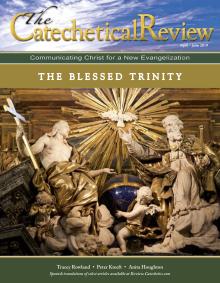n our previous issue, Dr. Kreeft explored several important issues that arise when we consider the questions of “who” and “when” as they relate to Christ in the Eucharist. In this article, he will examine three final questions, to help us better understand the Church’s teaching concerning our Eucharistic Lord.
What?
What activity is Christ performing in the Eucharist? Obviously, he is acting on us and in us in Holy Communion, both in body and soul, since he enters us both in body and soul not just in order to be there, to be actual, but also to be active in us. He does stuff to us. He saves us from ourselves, he washes away our sins, he justifies and sanctifies us, and glorifies us. He gives us all graces, he makes us, gradually, what he made Mary suddenly and totally, namely “full of grace.” For us, this process is not completed and perfected in this life, as it was for Mary. But what God did to her, he does to us. He does—he is now at work doing—a far greater work than making the entire universe out of nothing: he is making saints out of sinners. The whole world is like that more-than-magical-box we call the confessional: Adam walks in and Jesus walks out. Christ does what only God can do: he creates in us a clean heart. He is performing heart surgery on us. He is what T.S. Eliot called “the wounded surgeon.” Holy Communion is heart surgery.
But what is Christ doing there in the Eucharist all the time, even when we are not receiving Holy Communion and when we are not offering his Body and Blood to the Father for the salvation of the world as we assist at the Mass? What is he doing there during Eucharistic adoration? And what is he doing right now?
St. Thomas answers that question in a single word, a wonderful word, in the most perfect and beautiful Eucharistic hymn ever written. The first line is “Adora te devote, latens deitas, quae sub his figuris vere latitas.” (Devoutly I adore thee, hidden deity, Who beneath these figures hideth there from me.) That word latitas is the answer to our question, “What is Christ doing there?” He is hiding.
The rest of this online article is available for current Guild members.
This article is from The Catechetical Review (Online Edition ISSN 2379-6324) and may be copied for catechetical purposes only. It may not be reprinted in another published work without the permission of The Catechetical Review by contacting [email protected]

















